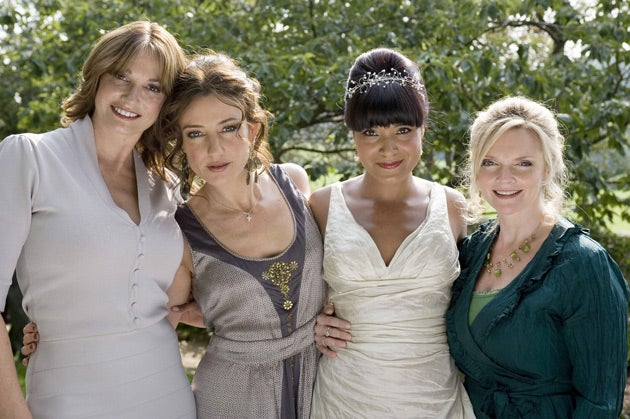Last Night's Television - Mistresses, BBC1; Law and Order, BBC4
They're still in good nick

The BBC DVD copy of Law and Order has a Daily Express quote on the back cover: "G F Newman has secured a place in television history with this powerful quartet". I assume the remark is roughly contemporaneous with Law and Order's first broadcast in 1978 – when the series stirred up enough fuss to get senior politicians fulminating – and it's undoubtedly true. Check any decent history of British television and Law and Order is in there. The problem lies in what a patchy, amnesiac affair television history is. A series can earn its place in it, after all, and never be heard of again. So it's genuinely interesting to be able to see Newman's bleak and disenchanted take on British justice in a new context. When it first went out Grange Hill had just started, and the industry standard for television police drama was The Sweeney, to which it offered a genuinely shocking contrast. Nobody scattered cardboard boxes in a slewing Ford Cortina in Law and Order. They were far too busy in a pub lavatory somewhere, taking a back-hander to make sure that evidence conveniently disappeared.
Law and Order merited an immediate repeat at the time but has had to wait 31 years to get it, and by accident of timing it goes out now hard on the heels of Red Riding, Channel 4's adaptation of David Peace's novels about corruption in the West Yorkshire Police. There are some obvious cosmetic differences. There's virtually no swearing in Law and Order, beyond the odd "bastard", and the detectives are mysteriously reluctant to use racial epithets, both of which I take to be evidence of a delicacy that died some time ago. There aren't any self-conscious touches of art in the direction either, because Les Blair opted for an uninflected, semi-documentary style that only amplified the drama's political problems at the time. Most significantly, though, there's this difference: Red Riding addresses a scandal that's well over 30 years old. Law and Order was poking at an open wound, since Operation Countryman, a huge investigation into corruption in the Metropolitan Police, began in the same year that Newman's drama was broadcast.
Its form was unusual. One story seen from four perspectives, the first of which was "A Detective's Tale", in which Derek Martin played Fred Pyle, a corrupt DI with a telling complacency of manner. He was so at ease with the underhand that he barely broke sweat, whether he was taking delivery of a thick wad of notes for his part in covering up a crime or coercing a guilty plea out of a defendant by pointing out to him that a period on bail might be better than waiting on remand for a trial: "You'll be able to do a bit of villainy and provide for your family when you do go away". If Law and Order is showing its age, it is perhaps in the matter-of-factness of its manner, so studiously underplayed that it sometimes feels a little artificial. We've learnt a lot about how to do dead-pan normality in the intervening years, but then quite a lot of what has been learnt stems from dramas like this. And overall it's aged astoundingly well. There was a moment when a publican delivered Parr's scotch to him and asked for 30 pence, and you found yourself suddenly remembering how many years have passed. Most crucially, this was a drama that dared to leave the audience a little in the dark in some scenes, on the assumption that they would scramble to catch up, a model for countless police procedurals that followed it. Compulsory watching for television genealogists, I would say, but pretty good watching even for those who don't give a damn about ancestry and pedigree.
I somehow doubt that we'll be watching Mistresses in 31 years' time, despite the indiscriminate afterlife of the DVD. And since it looks creakily antiquated even now it'll be a strange affair if anyone decides to trip down memory lane. I might as well own up to the fact that I haven't been in a steady relationship with Mistresses since about three episodes into the first series. Last night was just one of those meaningless one-night stands that occur so frequently in the drama itself. It meant nothing, honestly, and I won't be doing it again, a promise I hope to keep because last night's episode was the last of the current series. It ended in a welter of Mills & Boon wish-fulfilment: forgiveness and rapprochement and incipient broodiness were scattered about with scant regard to human psychology (a limiting detail that has never greatly troubled the creators of the series) or viewer's weak stomachs. "It'll be real... real, like my love for you," said Mark to Jessica, insisting that they could live happily ever after on "love and baked beans". I expected Jessica, who has been having trouble with morning sickness, to heave at this, but she took him back.
Subscribe to Independent Premium to bookmark this article
Want to bookmark your favourite articles and stories to read or reference later? Start your Independent Premium subscription today.

Join our commenting forum
Join thought-provoking conversations, follow other Independent readers and see their replies